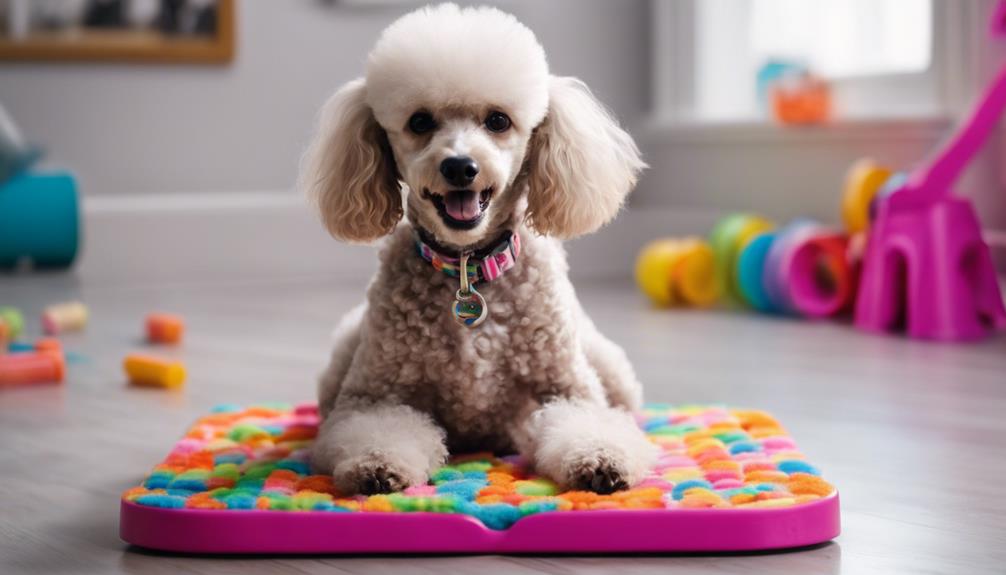To properly potty train your Poodle, patience and persistence are paramount. Begin by setting up a designated potty area and observing your pup's habits closely. But what comes next after laying the groundwork for training success? Stay tuned to uncover essential tips and techniques that will lead to a harmonious cohabitation with your furry friend.
Key Takeaways
- Recognize Poodle's readiness cues for effective training.
- Establish a consistent potty area in the yard.
- Use positive reinforcement and specific commands for success.
- Handle accidents calmly and redirect to designated spot promptly.
Determine Your Poodle's Readiness
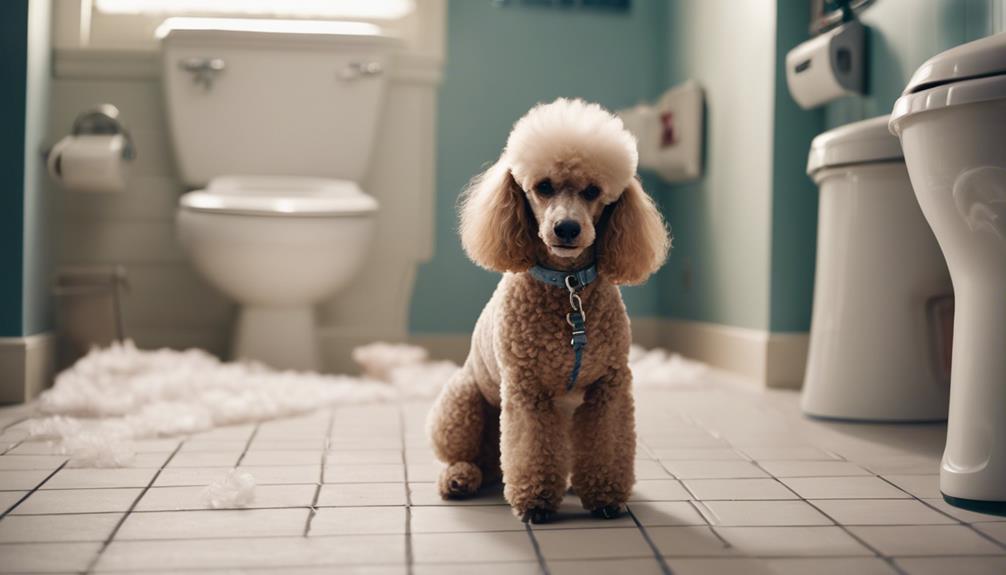
To gauge whether your Poodle is prepared for potty training, observe for specific signs of readiness such as sniffing, circling, or heading to a designated spot before eliminating. Poodles are typically ready for potty training between 12-16 weeks of age. Younger Poodles may have less bladder control, requiring more frequent potty breaks, while older Poodles can hold their bladder longer and may exhibit more consistent potty habits. Understanding your Poodle's individual cues and behaviors is crucial in determining their readiness for potty training. Signs like sniffing the ground, pacing or circling, and showing a preference for a specific spot can indicate that your Poodle is ready to begin training. By paying attention to these behaviors and adjusting your training approach based on your Poodle's readiness, you can set them up for successful potty training. Remember, consistency and positive reinforcement play key roles in helping your Poodle learn this important skill.
Set Up Potty Training Area
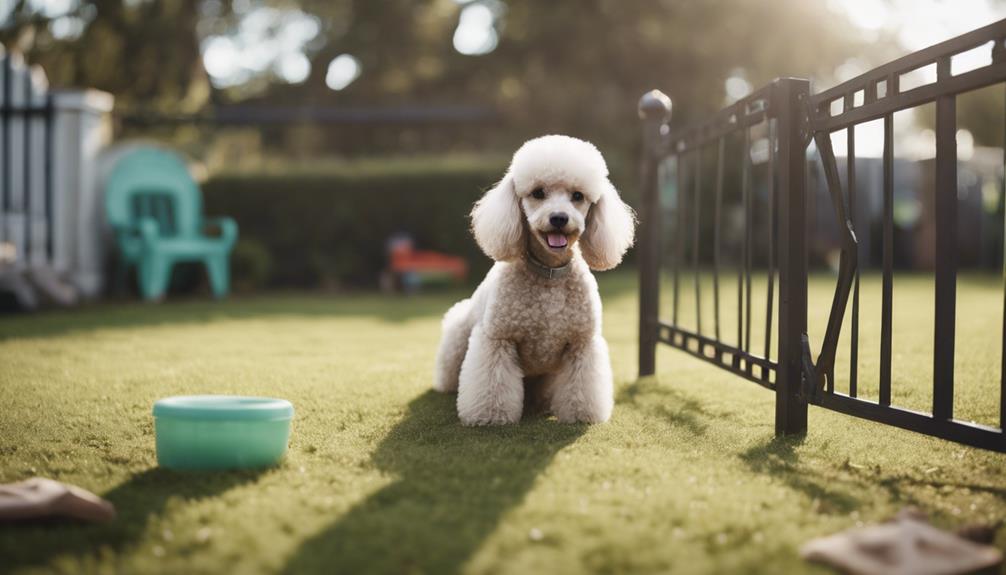
When setting up the potty training area for your Poodle, choose a designated spot in your yard where they can relieve themselves consistently. Designate a specific location that is easily accessible and away from high-traffic areas to help your Poodle recognize it as their potty area. Remember to provide positive reinforcement and rewards to encourage your Poodle to use the designated spot regularly.
Choose Designated Spot
Consider designating a specific area in your yard for your Poodle to use as their potty spot. Here are some tips for setting up the potty area:
- Choose a spot that is easily accessible and away from high traffic areas.
- Ensure the spot is well-drained and away from water sources to prevent contamination.
- Use visual markers or scents to help your Poodle recognize the designated potty area.
- Consistency in using the same spot will help reinforce the potty training routine for your Poodle.
Use Consistent Location
For optimal potty training success with your Poodle, establish a consistent location in your yard designated specifically for their potty needs. Setting up a designated potty spot helps reinforce the potty training routine and allows your Poodle to learn where they should relieve themselves. Consistency in using the same outdoor location aids in reinforcing good potty habits. By having a consistent potty area, your Poodle will quickly associate that spot with going potty, making the training process more effective. Remember, creating a designated potty spot is a key step in ensuring your Poodle understands where to go and helps in establishing a reliable routine.
| Benefits of Using Consistent Potty Spot |
|---|
| Reinforces potty training routine |
| Helps establish good potty habits |
| Creates a clear association for your Poodle |
| Supports effective potty training |
Provide Positive Reinforcement
To effectively set up the potty training area for your Poodle, establish a specific phrase like 'Go potty' to associate with the desired behavior. Here are some key steps to provide positive reinforcement in the designated area:
- Offer enthusiastic praise when your Poodle eliminates in the designated spot.
- Reward your Poodle with treats immediately after they finish going potty in the designated area.
- Use consistent positive reinforcement to reinforce the desired potty training behavior.
- Create a designated relief area in your yard for potty training purposes.
- Ensure that your praise and treats are given promptly to help your Poodle make the connection between the behavior and the reward.
Consistency and positive reinforcement are key in successfully potty training your Poodle.
Teach a Potty Command
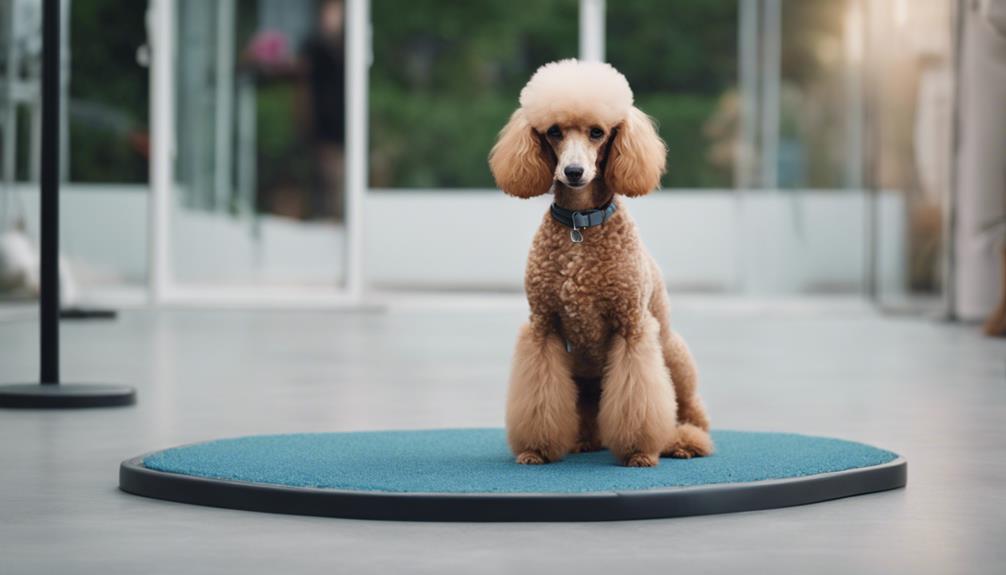
When teaching your Poodle a potty command, remember to use a consistent phrase like 'Go potty' to reinforce the behavior. Repetition of the command helps your Poodle understand the purpose of going outside to eliminate. Praise and reward your Poodle immediately after successful potty trips to positively reinforce the command.
Potty Command Importance
Implementing a potty command like 'Go potty' is pivotal in guiding your Poodle to associate a specific phrase with the act of eliminating during potty training. Here's why it's important:
- Teaching a potty command like 'Go potty' helps your Poodle associate the phrase with the act of eliminating.
- Consistency in using the potty command aids in reinforcing the desired behavior during potty training.
- Poodles are intelligent and can quickly learn to associate the potty command with the action of going to the bathroom.
- Using a specific phrase for pottying helps communicate expectations and cues to your Poodle.
- Positive reinforcement paired with the potty command encourages your Poodle to eliminate in the designated area.
Training Consistency Crucial
Potty training your Poodle consistently by teaching a specific command like 'Go potty' is crucial for successful training outcomes. Consistency in using the potty command every time you take your Poodle outside helps them associate the phrase with the desired behavior of eliminating. Poodles, known for their intelligence, can quickly learn to understand and respond to the potty command. This specific command aids in differentiating between regular outdoor activities and designated potty time. Through repetition and positive reinforcement, your Poodle will grasp the connection between the command and the action, paving the way for successful potty training. Remember, maintaining training consistency and using the potty command with positive reinforcement are key elements in achieving effective potty training for your Poodle.
Reward Positive Behavior
To effectively reinforce positive behavior during potty training, establish clear communication with your Poodle by teaching a specific command like 'Go potty'. Use consistent verbal cues to signal when it's time to eliminate. Reward your Poodle promptly after successful elimination to reinforce positive behavior. Positive reinforcement through treats, praise, or playtime helps your Poodle associate pottying outside with a positive experience. Consistency in using the potty command and rewarding immediately after successful elimination contributes to effective potty training. Remember, positive reinforcement and clear communication are key components in guiding your Poodle towards successful potty habits.
Establish a Routine
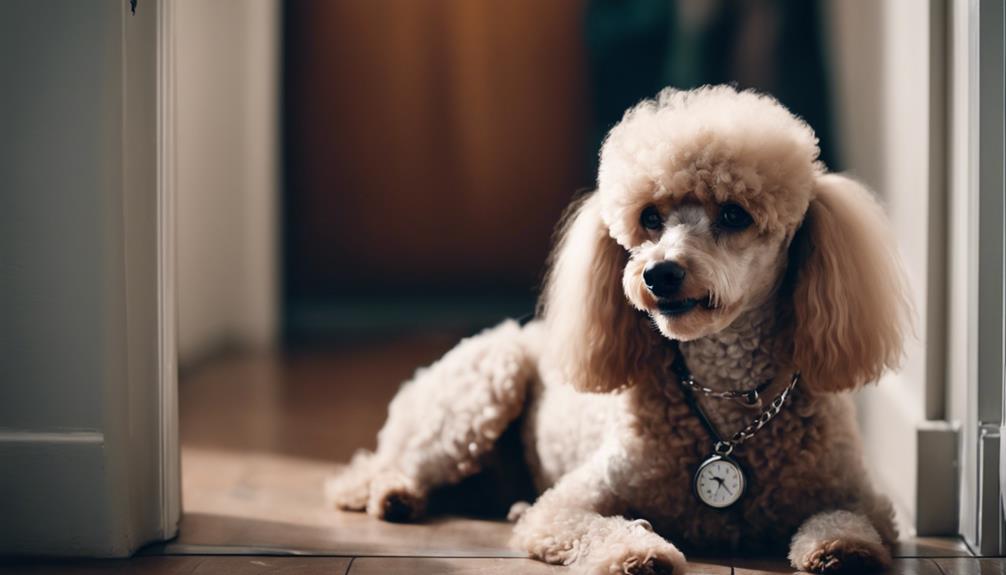
Establishing a consistent routine is essential for successful potty training your poodle. Puppies thrive on predictability, so setting a schedule will help them understand when it's time to go outside. A general rule of thumb is that a puppy can control their bladder for about one hour per month of age. Take your puppy outside regularly, at least every two hours, to the designated bathroom spot. Consistency is key; always go to the same spot so your poodle associates that area with going potty.
| Action | Description |
|---|---|
| Take outside | Take your puppy outside every 2 hours to the designated bathroom spot. |
| Establish routine | Create a consistent schedule for feeding, playtime, and potty breaks. |
| Reward elimination | Reward your puppy with treats and praise every time they go potty outside. |
| Track bathroom times | Keep a log of when your poodle eliminates to identify patterns and adjust. |
Use Positive Reinforcement
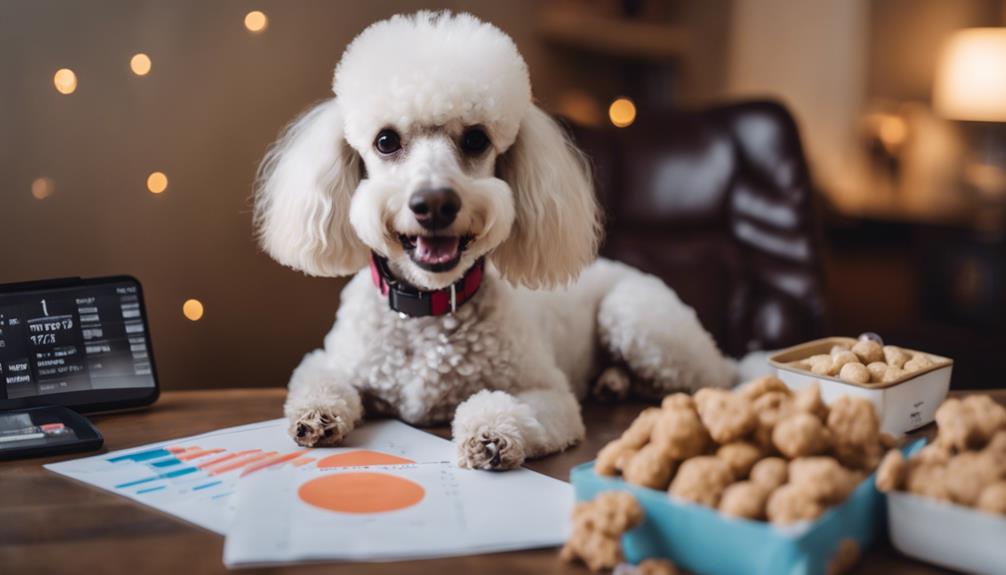
When potty training your poodle, utilizing positive reinforcement techniques such as rewarding with treats, praise, or playtime can significantly aid in reinforcing the desired behavior of going potty outside. Positive reinforcement is a powerful tool that helps shape your poodle's behavior and strengthens the bond between you and your furry friend. Here are some key points to remember when using positive reinforcement:
- Reward your poodle immediately after they finish going potty outside to create positive associations with the behavior.
- Consistently reward your poodle for going potty outside to effectively teach them the desired behavior.
- Using treats, praise, or playtime as rewards encourages your poodle to repeat the behavior of going potty outside.
- Positive reinforcement techniques help reinforce good behavior, making potty training a more positive experience for both you and your poodle.
- By incorporating positive reinforcement into your potty training routine, you can establish a strong foundation for successful training and a closer bond with your poodle.
Monitor Behavior Closely
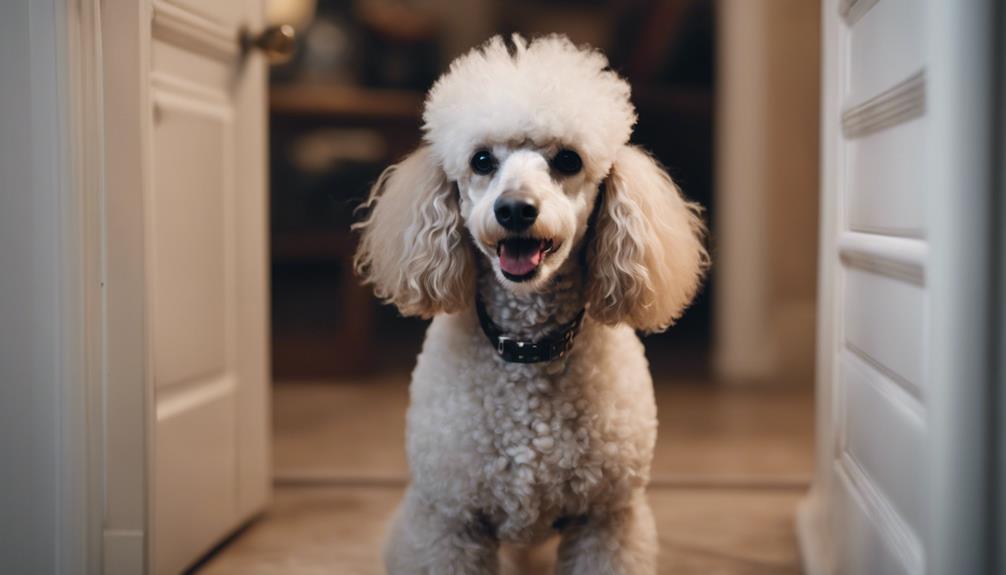
Observing your poodle's behavior closely is crucial during the potty training process to anticipate and address their potty needs effectively. Keep an eye out for signs like sniffing or circling, which indicate that your Poodle needs to go potty. By monitoring your Poodle's cues and body language, you can better anticipate their potty needs and prevent accidents.
| Monitor Behavior Closely | Key Points |
|---|---|
| Signs of needing to go | Watch for sniffing or circling as indicators. |
| Poodle's cues | Learn your Poodle's specific cues for potty time. |
| Anticipate potty needs | By observing behavior, anticipate when your Poodle needs to go. |
Being attentive to these cues will help you take your Poodle outside promptly when necessary, reinforcing the desired behavior of going potty in the outdoor relief area. Remember, handling accidents calmly and redirecting your Poodle to the designated potty spot will aid in effective potty training.
Handle Accidents Calmly
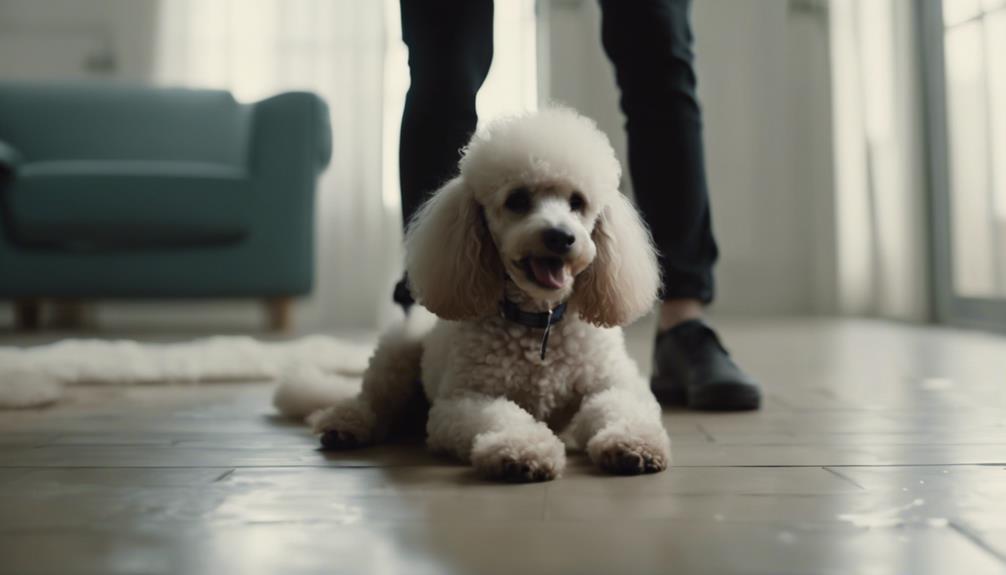
When accidents happen during potty training, it's crucial to stay calm and avoid scolding your Poodle. Promptly clean up the mess to eliminate odors and redirect your Poodle to the designated potty area. Consistency in handling accidents and using positive reinforcement will help your Poodle learn proper potty behavior.
Stay Calm After Accidents
Remain composed and collected in the face of accidents to ensure a positive and effective potty training experience for your Poodle. Accidents are bound to happen during the training process, but how you react is crucial. Here's how to handle accidents calmly:
- Stay calm and avoid showing frustration.
- Use accidents as teaching moments to redirect your Poodle to the right spot.
- Keep a positive attitude to create a supportive environment.
- Remember that accidents are part of the learning process.
- Approach accidents with patience and understanding.
Clean up Promptly
Maintain a clean and odor-free environment by promptly addressing accidents with enzymatic cleaners when potty training your Poodle. When accidents happen, avoid ammonia-based cleaners to prevent re-marking. These cleaners help eliminate odors and discourage your Poodle from returning to the same spot. Thoroughly cleaning accident areas is crucial to remove any scents that may encourage indoor pottying. By responding calmly to accidents, you create a positive learning environment without instilling a negative association with potty training. Consistently cleaning up accidents will help maintain a fresh and clean living space for both you and your Poodle.
| Clean Up Promptly Tips | Description |
|---|---|
| Use Enzymatic Cleaner | Helps eliminate odors and prevents re-marking |
| Avoid Ammonia Cleaners | Prevents attracting your Poodle back to the spot |
| Respond Calmly | Avoids negative associations with potty training |
Redirect to Designated Spot
Promptly guide your Poodle to the designated potty spot after any indoor accidents, maintaining a calm demeanor throughout the redirection process. Remember to avoid scolding and instead use a firm but gentle tone to guide them to the correct spot. Consistency is key; direct your Poodle to the designated outdoor relief area to reinforce proper potty behavior. Clear any indoor accident areas thoroughly with a cleaner to remove odors and prevent re-soiling. By redirecting to the designated spot, remaining calm, and providing clear guidance, you'll help your Poodle understand where they should go potty, making the training process smoother for both of you.
Be Patient and Consistent
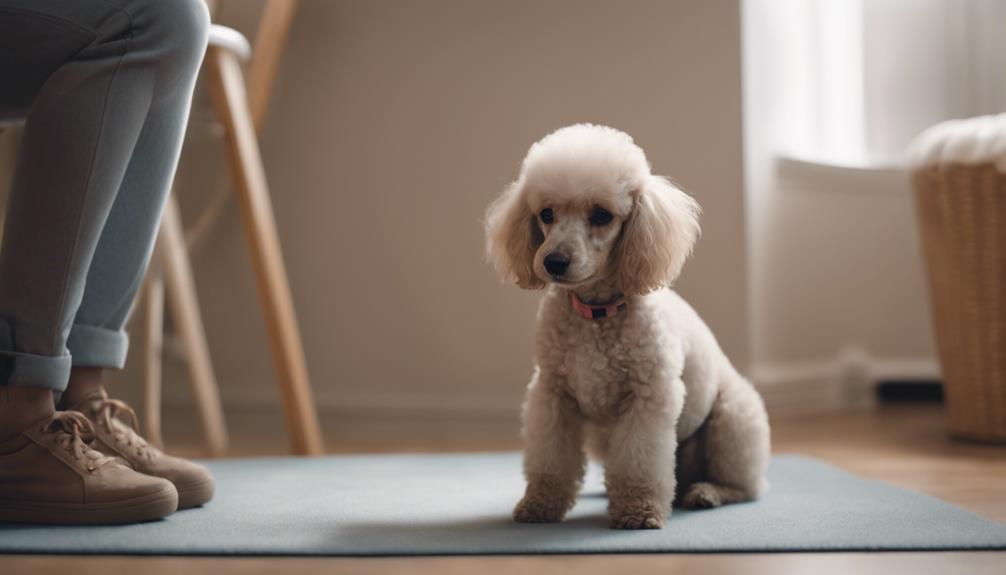
To successfully potty train your Poodle, maintaining patience and consistency is crucial for establishing good habits. Potty training can be a challenging process, but with the right approach, you can help your Poodle learn where and when to go potty. Patience is key when accidents happen. Instead of getting frustrated, use these moments as opportunities for additional training. Consistent routines play a vital role in your Poodle's understanding of what is expected. By using positive reinforcement and encouragement, you can reinforce good behavior and create a positive association with potty training. Remember to be patient with your Poodle during this learning process. Consistency in your training methods and expectations will help your Poodle grasp the desired behaviors more effectively. By staying patient and consistent, you are laying the foundation for successful potty training and building a strong bond with your furry companion.
Gradually Increase Freedom
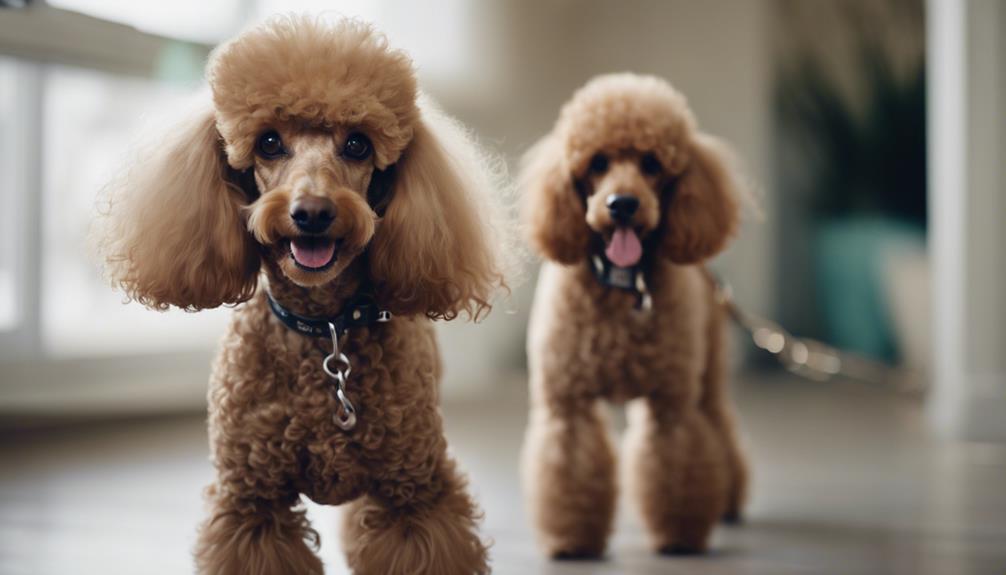
As your Poodle consistently demonstrates reliability in their potty training, you can start gradually increasing their freedom to reinforce good bathroom habits. This step-by-step process is crucial in helping your furry friend develop responsible bathroom behavior. Here's how to effectively implement this strategy:
- Monitor Behavior: Keep a close eye on your Poodle's behavior in new areas to ensure that successful potty habits are maintained.
- Return to a Smaller Area: If accidents occur during this phase, it's important to return your Poodle to a smaller area to reinforce their potty training.
- Encourage Responsibility: This approach helps your Poodle learn to hold it and encourages responsible bathroom behavior.
- Develop Good Habits: By gradually increasing freedom, you can aid your Poodle in developing good potty habits and avoiding accidents indoors.
- Reinforce Training: Consistency is key in reinforcing your Poodle's potty training progress and ensuring long-term success in their bathroom habits.
Nighttime Potty Training Strategies
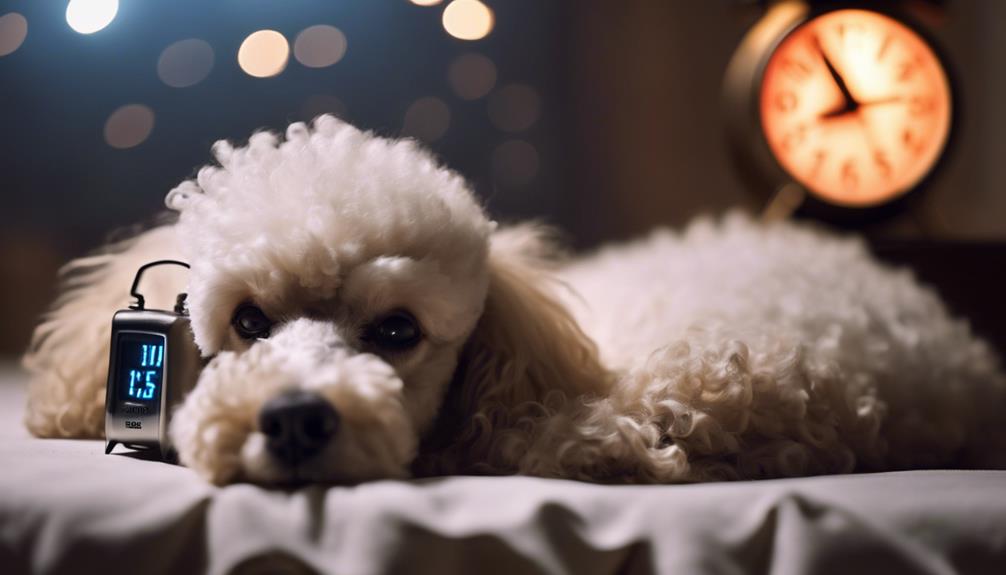
Limit your Poodle's water intake before bedtime to help reduce the likelihood of nighttime accidents during the potty training process. Taking your Poodle out for a final potty break right before bedtime can also help minimize accidents. Gradually increasing the time between nighttime potty breaks as your Poodle's bladder control improves is crucial. A consistent bedtime routine is essential to signal to your Poodle that it's time to sleep, aiding in potty training. Consider setting an alarm to wake up once or twice during the night to take your Poodle outside if needed.
| Nighttime Potty Training Strategies |
|---|
| Limit water intake before bedtime |
| Take Poodle out for a final potty break before bedtime |
| Increase time between nighttime potty breaks |
| Establish a consistent bedtime routine |
| Set an alarm for nighttime potty breaks |
Effective Poodle Potty Training Tips
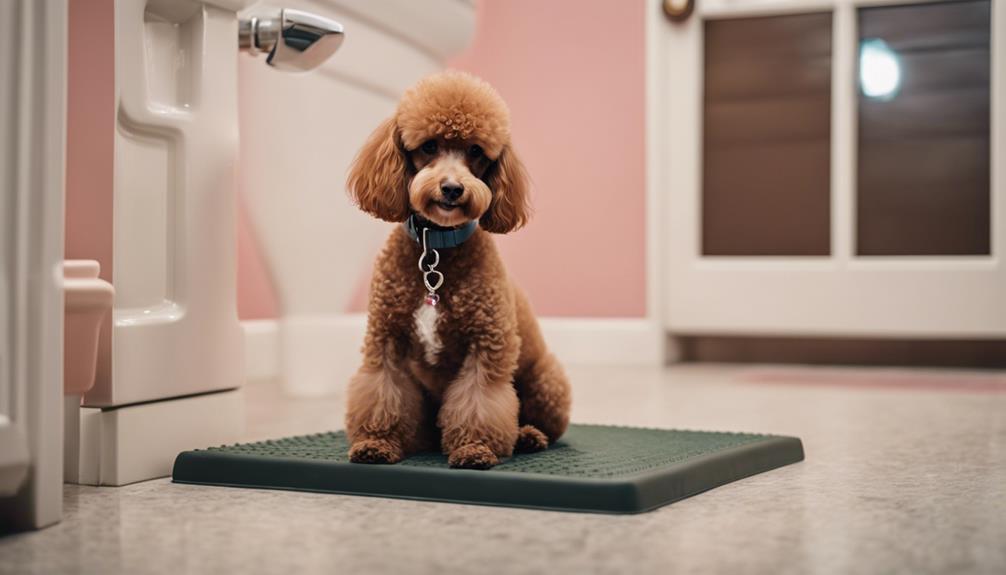
Establishing a consistent routine for your Poodle's potty training is essential for success. Here are some effective Poodle potty training tips to help you along the way:
- Take your Poodle outside every two hours during the day for potty breaks: Regular trips outside help reinforce the desired potty behavior.
- Utilize positive reinforcement techniques: Praise, treats, and immediate rewards can encourage your Poodle to go potty in the right place.
- Monitor your Poodle for signs: Watch for behaviors like sniffing or circling that indicate they need to go potty.
- Use confinement strategies: Employ a properly sized crate or playpen to limit space when unsupervised, promoting good potty habits.
- Gradually increase your Poodle's freedom: As your Poodle becomes more reliable, allow more freedom while still monitoring behavior and making adjustments as needed.
Frequently Asked Questions
How Do I Potty Train My Poodle?
To potty train your Poodle effectively, utilize crate training, positive reinforcement, and consistency. Outdoor walks, puppy pads, and handling indoor accidents promptly are essential. Stay patient and reward good behavior to reinforce positive habits.
What Is Basic Training for a Poodle?
To train your Poodle, focus on leash training, clicker training, crate training, positive reinforcement, obedience classes, and socialization skills. Consistent practice and patience help build a strong bond and create a well-behaved, happy companion.
What Is the Best Age to Train a Poodle?
Starting early is key when training your Poodle. Around 8 weeks old is ideal. Develop good habits with consistent routines, positive reinforcement, and patience. Older pups might learn faster, but early training lays a solid foundation.
Are Poodles Easy to Train?
Poodle intelligence makes them easy to train. Use consistent methods and positive reinforcement. Crate training and a bathroom schedule help. Your poodle's loyalty and eagerness to please will shine through with proper guidance.
Conclusion
Congratulations on taking the first step towards successfully potty training your Poodle! By following the step-by-step guide and incorporating positive reinforcement techniques, you are on your way to a well-trained and happy companion. Remember to be patient, consistent, and understanding of your Poodle's needs throughout the training process. With dedication and love, you will soon enjoy a harmonious relationship with your potty-trained Poodle. Happy training!
